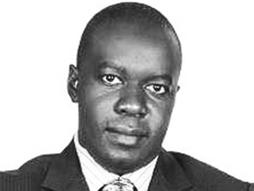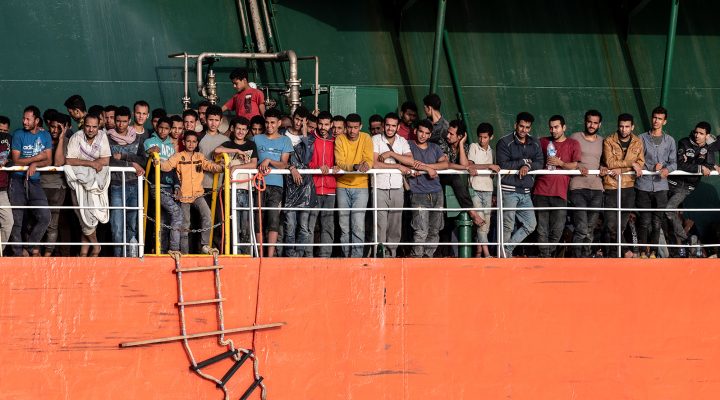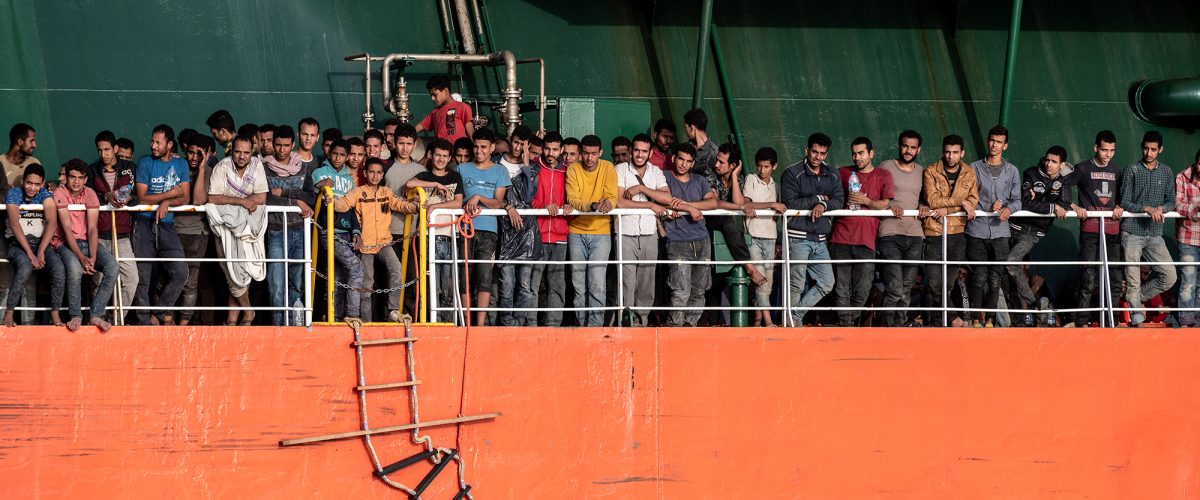In its message marking this year’s World Refugee Day June 20, the United Nations came up with a three-word catch phrase it believes should define how refugees are treated globally: “Whoever. Wherever. Whenever.”
The subtheme is: “Everyone has the right to seek safety.”
The expression was bolstered by the view of António Guterres, U.N. secretary-general, who said: “People escaping violence or persecution must be able to cross borders safely. They must not face discrimination at borders or be unfairly denied refugee status or asylum due to their race, religion, gender or country of origin.”
Days after these views were expressed, they were subjected to a litmus test in Melilla, a Spanish border town with Morocco, where migrants seeking to make their way into the European country came up against a human wall of security officials who resisted their entry. In the resultant chaos, at least 18 people died, according to media reports.

Spanish Prime Minister Pedro Sánchez (R) chats with British Prime Minister Boris Johnson before a dinner with the leaders of the NATO member states on the sidelines of the NATO Summit at El Prado Museum on June 29, 2022 in Madrid, Spain. (Photo by Ballesteros – Pool/Getty Images)
Spanish Prime Minister Pedro Sánchez said the violent incident was an “attack on the territorial integrity” of Spain and blamed it on human traffickers out to exploit their victims. Human rights and migrant groups expressed sadness and concern over the incident and advised against the use of excessive force.
Africa at the center
The Melilla tragedy is the latest disaster associated with the desire of people to move elsewhere in search of a better life. Many of those refugees originate from Africa and many— up to 85%, according to the African Union — are to be found living within Africa.
According to the United Nations High Commissioner for Refugees, in the first six months of 2021 alone, “nearly 385,000 people were granted international protection either on an individual (240,200) or group (144,700) basis.” Of this number, “more than 71,800 people fled the Central African Republic, where large-scale election-related violence erupted at the end of 2020. … In South Sudan, … intercommunal violence has continued to increase. … As such, 61,700 people from South Sudan became refugees in the first half of 2021. Significant numbers of people from Syria (38,800), Afghanistan (25,200) and Nigeria (20,300) were newly recognized as refugees during the first six months of 2021.”
Apart from European countries like Spain, the United Kingdom and United States of America are preferred destinations for many people fleeing persecution, war, violence or poverty. The latest examples are Afghanistan, where the Taliban seized power last year, and Ukraine, where a war initiated by Vladmir Putin has killed thousands and displaced millions of people.
According to latest data from the U.S. Department of Homeland Security, more than 71,000 Ukrainians have found their way to the United States since Feb. 24, when the Russian invasion of Ukraine began. With no end in sight to the war, that figure is likely to rise, as the Biden administration has committed to welcome 100,000 Ukrainians to the U.S.
While some people commend the American government’s gesture, others say it hints of racism. While nationals of African countries like Cameroon who have been clamoring for Temporary Protected Status in America have been waiting for months and years, Ukrainians got priority access.
A double standard
Lynn Tramonte, a migration activist and founder of the communications firm Anacaona, told BNG it seems odd to welcome Ukrainians with open arms when others continue to be treated differently.

Lynn Tramonte
“Why did Cameroonians have to be deported to their deaths for over two years before the administration granted them humanitarian protection — and then, only for those already in the United States — but Ukrainians were immediately welcomed with open arms?” she asked. “Why are Ukrainians allowed to apply for asylum at the U.S./Mexico border, but Haitians turned away and deported en masse?”
She wants “the same reception afforded to Ukrainians” to be the same “received by anyone fleeing for their life, from any religion and any continent.”
Yasin Kakande, a Ugandan journalist and author, also says the Ukraine war has exposed deep-seated realities of human skin color.
“The Ukraine case has confirmed what we all along did know, that it is not all migrants being targeted but mostly non-white migrants. President Donald Trump epitomized the policy attitude when he asked why the U.S. didn’t just take only migrants from Norway. The world we live in still has a color problem, and being Black still remains a disadvantage in such leaders’ eyes.”
It wasn’t just the U.S., however, that has been called out for bias.
In the desperate effort to flee the war in Ukraine, Africans who were living there say they were processed after white-skinned Ukranians. Similar biases against African students fleeing Ukraine to study elsewhere in Europe have been reported.
A result of historic racism
Tramonte argues that perceptive racism in the U.S. has its roots in the country’s evolution but that many prefer to deny it.
“A majority of white society in the U.S. does not admit it has implanted racist structures to their benefit,” she said. “This is true of immigration policy as well as other issues. The first migrants to the United States were colonizers who carried out a genocide. The second large group was brought in chains and treated like animals. The social, legal and economic system this country built from that foundation looks different than it did 200 years ago but has the same power structures.”
Today, as before, migrants create enormously beneficial economic contributions to the U.S., Tramonte said. “Today’s migrants absolutely contribute to the United States. There’s no question of that. But we are not a ‘nation of immigrants’ who offers ‘freedom for all.’ Today’s immigrants are walking into a country that has not been honest about itself and systemic racism.”
“The system default is denial, not acceptance of people’s cases. The small number of people who enter the U.S. as refugees basically beat all odds.”
The historic denial of basic humanity to Black and indigenous people and other people of color “shows up in our asylum system, which mistrusts the accounts of people fleeing danger and sets impossible standards for them to meet in order to obtain legal safety here. The system default is denial, not acceptance of people’s cases. The small number of people who enter the U.S. as refugees basically beat all odds. They won the lottery. Instead, I want our system’s default to be welcome, acceptance and humanity for all.”
Still, a hope for a better life
Kakande, who lived in the Middle East before moving to the U.S., believes what keeps many refugees or migrants going in their quest to resettle elsewhere is hope of a better life, even as the experiences differ from country to country.

Yasin Kakande
“I have been to Dubai, Qatar and now the United States, and I will tell you it certainly was not a bed of roses to migrate, and it would be far too difficult to even start ranking where I experienced the worst treatment,” he said. “The Arabs in the Gulf Region treat migrants like slaves while the Americans will impose troubling and bureaucratic restrictions that will separate migrants from their families, possibly for many years.”
Despite its promises for progress, the Biden administration has proved to be more talk than action, he said. “Biden, despite being fronted as a champion of diversity, is yet to make any visible changes to the lives and acceptance of migrants in the USA. Refugees and migrants still must wait for long months to just be eligible to work legally and even longer times or years to have their refugee applications considered. In my opinion, the Democrats talk so well but deliver so little.”
And yet, frustrating as that is, the promise of America and other free countries makes refugees persevere: “There are better opportunities in most host countries than there are from countries from where migrants are coming.”
Anthony Akaeze is a Nigerian-born freelance journalist who currently lives in Houston. He covers Africa for BNG.
Related articles:
What I’ve learned from race conversations with refugees and immigrants | Opinion by Samira Izadi Page
Black and Asian refugees fleeing Ukraine face additional barriers, discrimination


